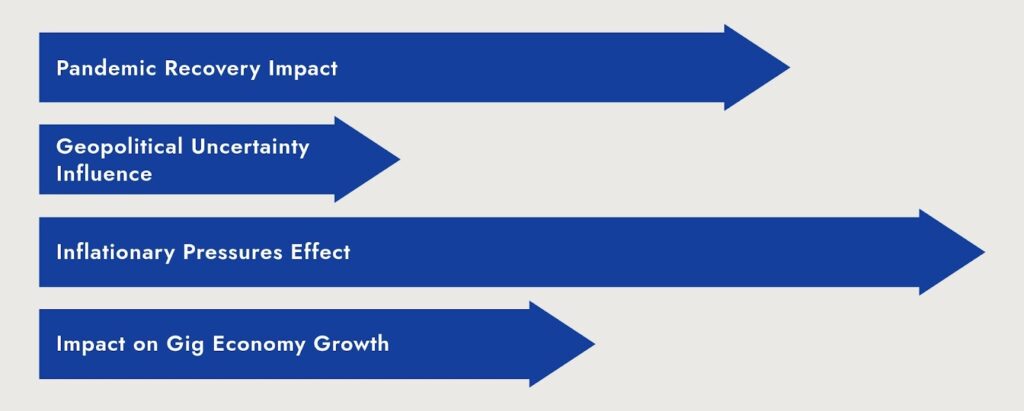The global job market is constantly evolving, driven by technological advancements, demographic shifts, and economic changes. These factors influence the types of skills in demand across various sectors, highlighting the need for industries and individuals to adapt swiftly. From the rise of AI and data science to the global transition toward green technologies, businesses and educational institutions must align themselves with these trends to stay competitive. This article delves into key job market trends and their role in shaping the demand for emerging industry skills, offering actionable insights for corporates and educators.
Understanding the Global Job Market Trends & Changes
As the global workforce undergoes transformative changes, understanding the driving forces behind these trends is crucial. Technological innovation, shifting demographics, and economic pressures collectively shape the job market landscape. Each factor contributes uniquely to the rising demand for emerging skills, requiring stakeholders to stay informed and proactive.
1. Technological Advancements
Technological innovation has reshaped industries worldwide, fostering automation, digitization, and the emergence of advanced fields like machine learning and blockchain. These advancements create a demand for highly specialized emerging skills such as programming, cloud computing, and cybersecurity.
- AI and Automation: AI-powered tools are now integral to industries ranging from healthcare to finance. Companies require talent proficient in AI development, ethical AI usage, and machine learning algorithms.
- Data-Driven Decision-Making: The explosion of big data has heightened the need for data scientists who can derive actionable insights from vast datasets.
2. Demographic Shifts
Changes in global demographics, such as aging populations in developed countries and youthful demographics in emerging economies, affect workforce availability and skill demand.
- Aging Workforce in Developed Nations: Countries like Japan and Germany face labor shortages, spurring demand for healthcare professionals, robotics engineers, and workers skilled in elderly care technologies.
- Youthful Workforce in Emerging Markets: In nations like India and Nigeria, a young workforce drives demand for education in emerging industry skills, including software development and renewable energy.
3. Economic Influences
Global economic trends, including recovery from the pandemic, geopolitical uncertainties, and inflationary pressures, have significantly influenced job market trends.

- Green Economy Transition: Governments and corporations globally are committing to sustainability goals. This has accelerated the demand for professionals skilled in renewable energy technologies, carbon footprint analysis, and sustainable urban planning.
- Gig Economy Growth: The rise of freelancing platforms reflects a shift towards flexible work models, creating opportunities for experts in niche domains like digital marketing and AI consultancy.
How Emerging Skills Shape the Future of Industries?
Industries worldwide are undergoing a period of transformation, fueled by the integration of advanced technologies and sustainable practices. In this context, the significance of emerging skills cannot be overstated. These skills act as catalysts for innovation, enabling businesses to adapt to changing market dynamics and consumer expectations.
1. Artificial Intelligence and Data Science
AI and data science are pivotal in driving automation and intelligent decision-making across industries. The rise of AI has led to demand for:
- AI Developers: Professionals adept at creating algorithms and neural networks.
- Data Analysts: Experts in interpreting complex data to influence strategic decisions.
- Ethical AI Specialists: Ensuring AI is deployed responsibly and inclusively.
2. Green Technologies

The global focus on sustainability has positioned green technologies as a critical area of skill demand.
- Renewable Energy Experts: Engineers and scientists specializing in solar, wind, and other sustainable energy sources.
- Sustainability Consultants: Professionals advising corporations on reducing their carbon footprint.
- Circular Economy Designers: Innovators creating systems to recycle and reuse resources efficiently.
3. Tech-Driven Healthcare

The healthcare sector increasingly integrates technology, fostering the need for:
- Telemedicine Professionals: Facilitating remote diagnosis and treatment.
- Biotechnology Specialists: Innovating in drug development and genetic engineering.
- Health Data Analysts: Utilizing patient data for predictive healthcare solutions.
How Skill Demand Varies Across Different Regions?
Regional differences play a significant role in shaping skill demand. While some regions excel in technological innovation, others lead in sustainability efforts or industrial growth. Understanding these variations is essential for businesses and educators looking to capitalize on global opportunities.
1. North America
- Technology Focus: A hub for AI, cloud computing, and cybersecurity.
- Sustainability Goals: Rising demand for green technology experts.
2. Europe
- Green Technologies: Leading the renewable energy transition.
- Aging Population: High demand for healthcare and robotics professionals.
3. Asia-Pacific
- Youth-Driven Workforce: Dominance in IT outsourcing and software development.
- Smart Cities Development: Opportunities for urban planners and IoT experts.
4. Africa
- Renewable Energy Potential: Growing investments in solar and wind energy.
- Tech Startups: Rapid growth in fintech and e-commerce sectors.
5. Latin America
- Agritech Innovations: Demand for AI and IoT in agriculture.
- Sustainability Experts: Supporting eco-friendly industrial practices.
How to Achieve Global Alignment in Skill Demand & Supply?
In a world where skill gaps persist across regions, global collaboration presents a viable solution. Aligning educational standards and corporate practices can help address these gaps while fostering innovation.
- International Training Programs: Initiatives to train professionals in emerging industry skills.
- Global Freelancing Platforms: Enabling cross-border access to specialized talent.
- Standardization of Skill Certifications: Recognizing qualifications internationally to boost mobility.
How to Adapt Effectively to Changing Skill Requirements?
To thrive in an ever-changing job market, corporates and educational institutions must adopt proactive strategies. These measures ensure they remain at the forefront of innovation while addressing workforce challenges effectively.
1. For Corporates
- Upskilling Programs: Regular training in job market trends and advanced technologies.
- Talent Pipelines: Partnerships with universities to ensure a steady supply of skilled graduates.
- Diversity Initiatives: Leveraging diverse demographics to meet skill demands effectively.
2. For Educational Institutions
- Industry-Aligned Curricula: Incorporating emerging industry skills into programs.
- Practical Training: Offering internships and hands-on projects in high-demand areas.
- Global Partnerships: Collaborating with international firms to align education with global job market needs.
Conclusion
Understanding global job market trends is vital for staying competitive in today’s economy. As industries evolve, the demand for emerging skills like AI, data science, and green technologies will continue to grow. Regional variations and economic influences present unique challenges and opportunities, emphasizing the need for strategic adaptation. By embracing upskilling initiatives and fostering global collaboration, corporates and educational institutions can ensure a workforce ready to meet the demands of emerging industries. To explore how data insights can guide your organization in adapting to these trends, sign up on JobsPikr today.



